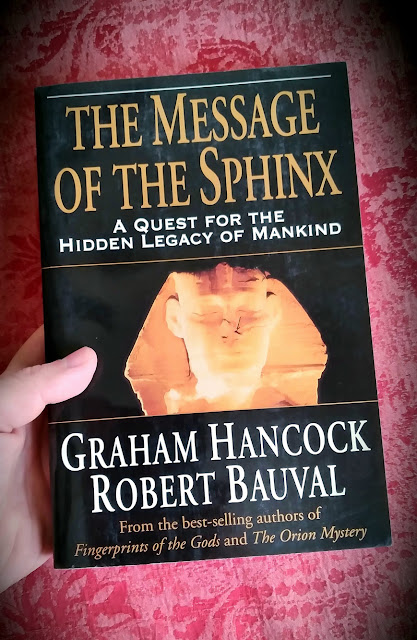 |
| The Message of the Sphinx. A Quest for the Hidden Legacy of Mankind. Ancient Egypt. Graham Hancock. Robert Bauval |
I've had "The Message of the Sphinx" by Graham Hancock and Robert Bauval on my bookshelf for a while and decided to read through it. I am, of course, familiar with the geological theory that water erosion on the body of the Sphinx points to it being much, much older than is commonly stated (the usual estimate is that the Sphinx is around 4,000 years old. The erosion theory suggests the age is actually closer to 12,000 years). This book explores that research and much more.
NATIONAL BESTSELLER • Two Egypt experts posit a revolutionary theory: The Sphinx and other great Egyptian monuments are older than common history books tell us and are arranged in such a way as to send us a message from the silent past.
Guardian of the ancient mysteries, the keeper of secrets . . . For thousands of years the Great Sphinx of Egypt has gazed toward the east, its eyes focused on eternity, reading a message in the stars that mankind has long forgotten. And today as our civilization stands poised at the end of a great cycle, it is a message that beckons insistently to be understood.
All the clues are in place. Geology and archeo-astronomy have already indicated that the lion-bodied Sphinx may be vastly older than Egyptologists currently believe, dating not from 2500 B.C., but from 10,500 B.C.—the beginning of the astrological Age of Leo. And we now know that the three pyramids of Giza, standing on high ground half a mile to the west of the Sphinx, are in fact a precise map of the three stars of Orion’s belt, formed in fifteen million tons of solid stone.
Are these monuments trying to tell us something? And, if so, what?
In The Message of the Sphinx, Robert Bauval and Graham Hancock present a tour de force of historical and scientific detective work that unravels the millennial code embodied in these structures. Using sophisticated computer simulations of ancient skies, they unravel the riddle of the Sphinx, and they present a startling new theory concerning the enigmatic Pyramid Texts and other archaic Egyptian scriptures.
Their discoveries lead the authors to this question: Does mankind have a rendezvous with destiny—a rendezvous not in the future, but in the distant past, at a precise place and time?
The secrets can be kept no longer. The Message of the Sphinx brings them to light.
